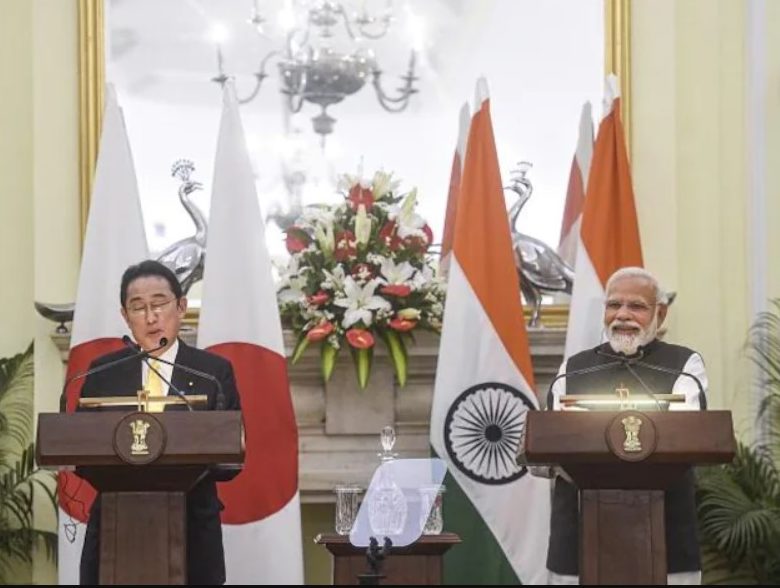Japan’s auto company Suzuki Motor Corporation ( SMC) announced signing a Memorandum of Understanding (MoU) with the government of Gujarat for domestic manufacturing of Battery Electric Vehicles (BEV) and BEV batteries.
It said it will invest 150 billion yen (about Rs 10,445 crore) by 2026.
Mou was signed “on March 19, 2022, at the India-Japan Economic Forum held in New Delhi, India, in the presence of Japanese Prime Minister Fumio Kishida and Indian Prime Minister Narendra Modi,” Suzuki Motor Corporation said in a statement.
Speaking at the India-Japan Economic Forum, Suzuki Motor Corporation (SMC) Representative Director and President Toshihiro Suzuki said, “Suzuki’s future mission is to achieve carbon neutrality with small cars. We will continue active investment in India to realize Self-reliant India (Atma-nirbhar Bharat).”
As per the MoU, Suzuki Motor Gujarat Pvt Ltd (SMG) will finance Rs 7,300 crore in setting up a plant for BEV batteries at a parcel of land adjoining SMG’s existing plant by 2026.
Besides, SMC will infuse another tranche of Rs 3,100 crore to ramp up the production capacity for BEV manufacturing by 2025, the statement said.
The Present Scenario:
The Suzuki group, at present, holds an aggregate production capacity of about 22 lakh units per annum across two facilities of its main subsidiary– Maruti Suzuki India (MSI) in Haryana and SMG’s facility in Gujarat for manufacturing of conventional internal combustion engine vehicles.
MSI’s production capacity at Gurgaon and Manesar plants in Haryana amounts to 15 lakh units per annum.
SMG in Gujarat has an additional installed production capacity of 7.5 lakh units per annum.
Maruti Suzuki Toyotsu India Pvt Ltd (MSTI)
In the statement, SMC added that Maruti Suzuki Toyotsu India Pvt Ltd (MSTI) will invest Rs 45 crore for the constructing vehicle recycling plant by 2025.
| Signees of MOU with the State of Gujarat | Description | Investment | Planned year |
| Suzuki Motor Gujarat Private Limited (SMG) | Increasing production capacity for BEV manufacturing | Rs 3,100 crore | 2025 |
| Construction of plant for BEV batteries (land neighboring to SMG) | Rs 7,300 crore | 2026 | |
| Maruti Suzuki Toyotsu India Private Limited (MSTI) | Construction of vehicle recycling plant | Rs 45 crore | 2025 |
Source: Press Release
In November 2022, MSTI, the joint venture of Maruti Suzuki and Toyota Tsusho Group, started operations concerning vehicle dismantling and recycling units at Noida, in Uttar Pradesh. In November 2019, both the companies had announced establishing the vehicle scrapping and recycling unit.
The 10,993 square meter facility can scrap and recycle over 24,000 ELVs (end-of-life vehicles) annually.
The Indian arm of Maruti Suzuki Corporation is keen to foray into the electric vehicles segment by 2025. The company, though, has an inhibition that selling affordable EVs at the current ongoing prices, that too at a mass scale, would be a hard nut to crack.
Maruti Suzuki, in 2019, had tested an electric vehicle based on its WagonR model with plans to launch them in 2020 but did not go ahead with its commercial launch for personal usage owing to lack of infrastructure and government support.
Clean Energy Partnership (CEP)
India and Japan also inaugurated the Clean Energy Partnership (CEP) to work together for sustainable economic growth, tackling climate change and guaranteeing energy security.
This initiative was announced on the occasion of the 14th India-Japan Annual Summit.
For the uninitiated, Japanese Prime Minister Fumio Kishida was on a two-day visit to India (March 19-20) for a summit with Indian PM Narendra Modi.
“The partnership will lead to clean growth by boosting job creation, innovation and investments. It will also demonstrate to the world that India and Japan are at the forefront in delivering on the ambitious climate and sustainable development goals,” a statement by the Ministry of External Affairs (MEA) on the collaboration said.
“Cooperation under this partnership will build on the work already being covered out by the two sides under the foundation of the ‘India-Japan Energy Dialogue’ established in 2007 and will substantially expand the areas of collaboration for mutual benefit,” the statement added.
“They (Indian and Japanese PMs) welcomed the launch of the India-Japan Clean Energy Partnership (CEP) for cooperation towards achieving sustainable economic growth, addressing climate change and ensuring energy security, in areas such as electric vehicles (EV), storage systems including batteries, electric vehicle charging infrastructure (EVCI), solar energy, clean including green hydrogen/ammonia, wind energy, exchange of views on respective energy transition plans, energy efficiency, CCUS (Carbon dioxide Capturing, Utilization and Storage) and Carbon Recycling,” a joint press statement by India and Japan said.

